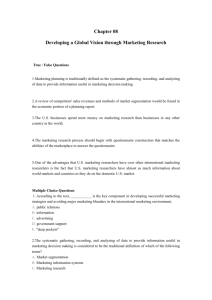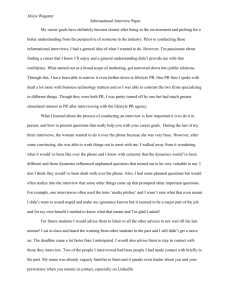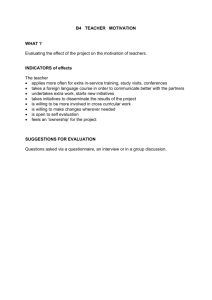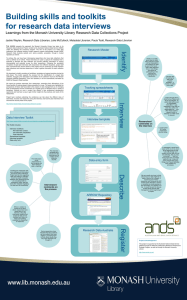4.04 PPT more info for the test
advertisement
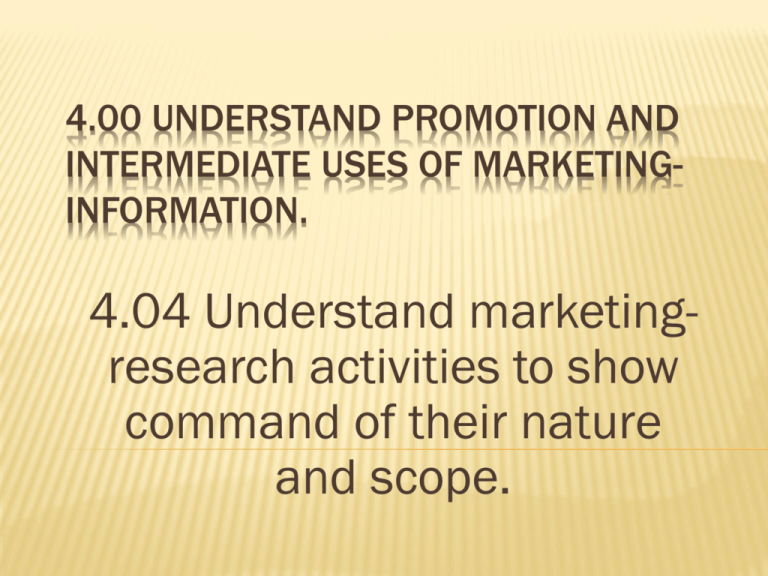
4.00 UNDERSTAND PROMOTION AND INTERMEDIATE USES OF MARKETINGINFORMATION. 4.04 Understand marketingresearch activities to show command of their nature and scope. 5-141 5-143 MARKET RESEARCH VOCABULARY Define the following terms: marketing research, secondary research, primary research, personal interview, mail interview, telephone interview, questionnaire, and focus group. Marketing research – Methodology for discovering the customer’s wants and needs the systematic gathering, recording, and analyzing of data about a specific issue, situation, or concern—is a valuable source of insight. It is an important component of a business’s marketing-information management system and helps businesses to make better decisions. Secondary research – collected from other sources (libraries, online, Federal/State/Local governments VOCABULARY Primary research – Directly collected from the company’s customers by the company Personal interview – Face-to-face personal discussion with the customer Mail interview – Questionnaire sent by mail to customers Telephone interview – Phone call made to a customer Questionnaire – set of information in question form Focus group – Group of customers brought together to discuss a company’s product(s) They offer their opinions and suggestions that are then recorded and analyzed by the company MARKET RESEARCH Identify characteristics of effective marketing research. Systematic - a step-by-step process similar to the scientific method Accurate - as exact and precise as possible so that wise business decisions are made Objective - Researchers must keep their own opinions out of the way while they are gathering data MARKET RESEARCH Thorough – To help a business with its decisionmaking, marketing researchers must gather sufficient data Timely – There are usually due dates associated with marketing research Reliable – if the same research was repeated or conducted by other researchers, the results would be the same Valid - it actually measures what the researcher intends to measure MARKET RESEARCH Describe the importance of marketing research. One of the most important ways that businesses use marketing research is to help them implement the marketing concept: a philosophy of conducting business that is based on satisfying customer wants and needs while achieving company goals. Marketing research helps businesses to identify those needs and wants. MARKET RESEARCH Explain how marketing research is carried out. 1. 2. 3. 4. 5. Indentify the problem Design a research plan Allocate resources ($’s, people, time, etc.) Do it Analyze the results Explain the uses of marketing research. To develop a profile of the typical customer To analyze the business’s sales and market share To describe the target market To determine how to reach the target market To forecast sales and trends To be more competitive To prevent unnecessary financial losses To keep up-to-date To maintain or determine image MARKET RESEARCH Describe shortcomings of marketing research. Based often on “statistical samples” rather than the whole market Respondents don’t always understand the questions and sometimes they don’t give the full truth Bias – not objective Describe types of marketing research objectives. To explore the current situation To define the current situation To test the situation To predict future situations MARKET RESEARCH Describe the contents of a research plan or design. What types of data are needed? How much data will be collected? Where will researchers find the data? What primary data-collection methods will be used? How will the data be analyzed? MARKET RESEARCH Classify types of marketing research data. Primary Secondary Distinguish between internal and external sources of data. Internal has already been collected by the company Customer External records has to be garnered (libraries, online, government) MARKET RESEARCH Describe types of data collection methods. Primary can include different types of surveys (direct mail, telephone, face-to-face, etc.) Secondary includes information that can be collected by: Purchasing reports (industry, news sources, etc.) Government sources (census, local, State, and Federal) Publicly available (libraries, online) MARKET RESEARCH Explain how data can be analyzed. Specialized software Trends, mathematical, graphing, etc. Describe steps in the marketing research process 1. 2. 3. 4. 5. 6. 7. Identify the Reason for the Research Set Research Objectives Develop a Hypothesis Determine the Research Design Collect the Needed Data Analyze the Data Make Recommendations Based on Findings 5-144 5-145 HOW TO RESEARCH Define the terms marketing research problem, decision problem, variables, unit of analysis, research objectives. Marketing research problem - asks what research needs to be done to solve the decision problem Decision problem - the basic issue the business’s managers are facing Variables – things that can change when conducting research Unit of analysis – individual, groups of people (customers), etc. Research objectives – what the company plans or needs to accomplish HOW TO RESEARCH Explain the importance of determining the actual marketing research problem/issue. Getting to the root of the problem will help a business’s managers to solve problems correctly without wasting time or money on ineffective strategies. Discuss the need to determine the “real” issue/problem rather than its symptoms. Fixing away a symptom will not make the problem go HOW TO RESEARCH Describe the steps involved in determining the marketing research problem/issue (e.g., clarifying and identifying the information needs, redefining the decision problem as a research problem, and setting research objectives. Discuss activities involved in identifying the information needs (e.g., determining the purpose of the research, understanding the complete problem, identifying measurable symptoms, determining the unit of analysis, and determining relevant variables). HOW TO RESEARCH Explain why researchers need to adjust the decision problem into a research problem. Describe the purposes of setting marketing research objectives. A decision problem is a simple question asked from the managers’ perspective. Sometimes, decision problems are discovery-oriented, or aimed at answering the questions “what?” or “why?” decision problems are strategy-oriented, or aimed at answering the questions “how?” or “which?” A research problem asks what research needs to be done to solve the decision problem. It’s a question asked from the researchers’ perspective. Narrows the scope and controls the cost of the research Explain the relationship between the research problem/issue and the marketing research objectives. Must be tied together or the research will not be relevant HOW TO RESEARCH Discuss how determining the marketing research problem/issue aids in determining whether to conduct the study. Managers should avoid any marketing research projects that don’t make financial sense. ($$$!!) Describe situations in which conducting a marketing research study would be inappropriate. The benefits of doing so don’t outweigh the costs The company doesn’t have the funds to conduct the research (shortcuts can make the findings untrustworthy) When launching an inventive new product—it may be difficult for “test” customers to properly evaluate its use



